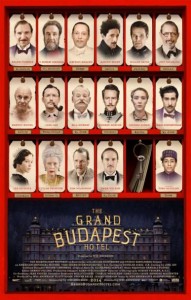 Writer/director Wes Anderson loves precious little worlds and his movies are not just created, they are curated. There’s a reason that this film is named for its location, not its characters or plot. Anderson is the master of “saudade,” the nostalgia for something you never had or that never existed. The Grand Budapest Hotel is as romantically imagined as its name, more vividly realized than any of the human characters in the movie, and we instantly feel the pang of its loss.
Writer/director Wes Anderson loves precious little worlds and his movies are not just created, they are curated. There’s a reason that this film is named for its location, not its characters or plot. Anderson is the master of “saudade,” the nostalgia for something you never had or that never existed. The Grand Budapest Hotel is as romantically imagined as its name, more vividly realized than any of the human characters in the movie, and we instantly feel the pang of its loss.
We enter through a Sheherezade-ian series of nesting narratives. A girl visits the grave of a writer, and we go back in time to see that writer (Tom Wilkinson) as an older man, talking about where writers get their stories (from real life), and then back again further as a younger man (Jude Law), actually getting the story in a bleak, bordering on seedy distressed version of the hotel, from an old man named Zero Mustafa (F. Murray Abraham). And then we go further back in time to see Zero as a young man, a proud lobby boy in the titular edifice, a gorgeously splendid, elegant, and luxurious resort in the mountains of a fictitious European country called Zubrowka, somewhere in the midst of Switzerland, Luxembourg, Austria-Hungary, and the Balkans. Anderson invites us into the artificiality of the memory within a memory within a story told by a stranger. He does not bother with cinematic tricks to make the hotel look real. We see it made out of paper, with a paper finicula pulled by a string to bring the guests up the mountain, as though it is part of a puppet show, which, in a way it is. At times it feels as though it is being put on with the marionettes from the “Lonely Goatherd” number in “The Sound of Music.” There is no effort to make the actors playing the younger and older versions of characters look alike. But the detail work is as meticulous as ever, so that must be intentional, and meaningful.
In the era of the Jude Law storyline, the hotel’s inept concierge is M. Jean (Jason Schwartzman). But, as Zero tells the story, in the heyday of the hotel, the concierge was the legendary M. Gustave (Ralph Fiennes). A concierge is there to be the all-purpose fixer, finder, and minder, like the entire staff of Downton Abbey in one. M. Gustave is infinitely attuned to the needs of the hotel’s wealthy, important, often noble (as in duchesses, not heroes), and always demanding clientele. There is a reason they are always referred to as guests. And if they require a particularly specialized and personal form of service, he is willing to oblige, even if the guest in question is a titled termagant in her 80’s (an hilariously unrecognizable Tilda Swinton as Madame D.) Fiennes gives a performance as perfectly precise as his character, whose flawless demeanor evokes exquisite deference, competence, and discretion. Like Anderson and Anderson’s autobiographical stand-in played by Schwartzman in “Rushmore,” M. Gustave is a showman, and one with an extravagantly grand and very ambitious sense of mise-en-scene. Early on, we see M. Gustave striding through the hotel lobby, a gracious farewell to a guest on one side, sharp but not unkind directions to staff who are not up to standard on the other. Later, in two intrusions by this story’s version of the Nazis and later, as a prisoner, he responds as though he is in a drawing room comedy. Fiennes pulls off the tricky balance between farce and drama as the story takes him through murder, art theft, love, war, and delectable pastries. And he is matched by newcomer Tony Revolori as the young Zero, a refugee who aspires to M. Gustave’s savoir faire, and who becomes first his protege and then his friend.
As always in a Wes Anderson film, starting with the very first scene of his first movie, “Bottle Rocket,” there is an escape. M. Gustave is imprisoned, but still strives to maintain an aura of gracious living. After a rough encounter with another prisoner, he is bruised but airily assures the visiting Zero that they are now dear friends. He confronts the direst of situations — or tries to — as though they are at the level of an errant lobby boy. But when he is deprived of his beloved fragrance, L’Air de Panache, he begins to crumble.
The details of the various time periods are, as expected, exquisitely chosen, well worth a second viewing. Ant it is a bit warmer than Anderson’s previous films, less arch, less removed, softer toward its characters, even tender. Anderson often makes objects more important than people but in this one, with the painting and the pastry almost character themselves on one side and Zero and his true love Agatha (Saoirse Ronan) still stylized but still heartfelt on the other, they’re getting closer.
Parents should know that this film includes wartime violence, with characters injured and killed, some graphic and disturbing images, strong language, sexual references and an explicit sexual situation.
Family discussion: Did M. Gustave and Zero have the same priorities? What is added to the story by seeing the author and Zero later in their lives?
If you like this, try: “Moonrise Kingdom” and “Rushmore”


